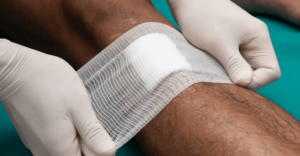
The healing process of an open wound can be a challenging and uncomfortable journey for patients. Proper management of pain and discomfort during wound healing is essential not only for the patient’s well-being but also for promoting optimal healing outcomes. Understanding the stages of open wound healing and employing appropriate pain management techniques are critical aspects of wound care.
Stages of Open Wound Healing: Hemostasis, Inflammation, Proliferation, and Remodeling
Open wound healing occurs through a series of stages, each with its unique challenges and requirements. The first stage, hemostasis, involves the formation of a blood clot to stop bleeding. In the inflammation stage, the body’s immune response works to remove debris and bacteria from the wound. Proliferation is the phase where new tissues and blood vessels are generated, and finally, remodeling strengthens and reorganizes the newly formed tissues.
Importance of Managing Pain and Discomfort
Managing pain and discomfort during wound healing is crucial for several reasons. Uncontrolled pain can lead to increased stress, delayed healing, and diminished quality of life for the patient. Additionally, pain can impact the patient’s ability to participate in their own care and rehabilitation, hindering their overall recovery process.
Methods for Assessing Pain Intensity
Assessing pain intensity is vital for tailoring an appropriate pain management plan. Healthcare providers may use various pain assessment scales, such as numerical rating scales or visual analog scales, to gauge the level of pain experienced by the patient accurately. This information helps in determining the most suitable pain management approach for the individual.
Considerations for Choosing Appropriate Analgesics
The choice of analgesic depends on the severity of pain, individual patient factors, and potential side effects. Over-the-counter pain relievers, such as acetaminophen or ibuprofen, may be sufficient for mild pain. For moderate to severe pain, prescription analgesics or other pain management techniques, such as nerve blocks or topical anesthetics, may be necessary. Healthcare providers carefully consider the patient’s medical history, allergies, and potential interactions with other medications before prescribing pain relief options.
Seek Professional Pain Management for Wound Healing at DFW Wound Care Center
At DFW Wound Care Center, our team of wound care specialists is dedicated to providing comprehensive and compassionate care to patients during their wound healing journey. With state-of-the-art facilities in Plano, Lewisville, Irving, and DeSoto, we offer a range of advanced wound care techniques, including hyperbaric oxygen therapy and negative pressure wound therapy. If you or your loved one is experiencing pain and discomfort during open wound healing, don’t hesitate to contact our experienced team. Schedule an appointment at the nearest location to receive expert pain management and personalized wound care treatment.
Contact us
Schedule an appointment
with our specialists by contacting us or calling our:
